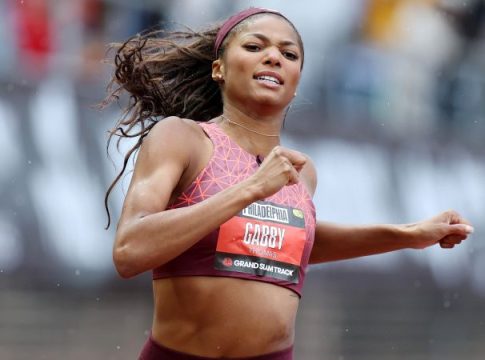Understanding Harassment in Sports: A Growing Concern
In recent years, as sports betting has become increasingly mainstream in the United States, an unsettling trend has emerged: harassment directed at athletes, often stemming from frustrated bettors. The unfortunate experience of Olympic champion Gabby Thomas at a recent track meet serves as a notable example of this disturbing behavior—a behavior that, while shocking, is unfortunately all too common.
The Impact of Sports Betting
Gabby Thomas was subjected to verbal abuse during a public event, where an individual followed her and hurled insults as she engaged with young fans. This incident was not an isolated one; it reflects a broader issue in the sports community. Since the 2018 Supreme Court ruling that legalized sports betting in many states, experts have noted a significant rise in harassment directed toward professional and collegiate athletes—an alarming trend that calls for our attention.
Sports betting has generated heightened emotions, leading some fans to direct their anger at players when bets do not turn out favorably. Reports indicate that a substantial percentage of abusive social media messages, particularly during high-stakes events like March Madness, were related to gambling outcomes. For instance, around 12% of messages analyzed during this period contained threats or aggressive remarks concerning bets that had been placed on individual performances.
The Human Cost of Gambling Pressure
The pressure of performance, often exacerbated by betting, can take a significant toll on athletes’ mental health. Clint Hangebrauck from the NCAA emphasizes that the problem is not limited to high-level athletes; college players are increasingly vulnerable to this kind of intimidation. The recent rise in sports betting has created an environment where players feel under siege—not just for their athletic performance, but for the financial losses suffered by fans.
Moreover, personal threats have escalated to disturbing levels. Several athletes have reported receiving death threats directed at themselves and their families, showcasing the severe consequences of betting frustration. Such harassment can have profound implications for athletes, not only impacting their performance but also their overall well-being.
Strategies for Addressing Harassment
To combat this troubling trend, both sports organizations and individual athletes are taking steps forward. Here are some strategies that can foster a healthier sporting environment:
-
Awareness Initiatives: Organizations like the NCAA are rolling out campaigns aimed at educating fans about the repercussions of their actions. By raising awareness, they hope to mitigate the likelihood of harassment.
-
Community Support: Encouraging open dialogues about mental health and fostering supportive communities can empower athletes to seek help when needed.
-
Establishing Boundaries: Athletes and teams can leverage social media tools to block or report abusive messages, creating safer online spaces.
- Responsible Gambling Advocacy: Promoting responsible betting practices is essential. Emphasizing the risks associated with gambling can help fans manage their expectations and reactions.
A Call for Compassion
As we navigate the complex intersection of sports and gambling, it’s crucial to remember the humanity of those we watch and support. Athletes are not merely performers; they are individuals with lives outside of their sports. The increased scrutiny and subsequent harassment can have lasting effects on their mental health.
Let us advocate for a sports culture that prioritizes respect and dignity for all players. By promoting compassion and understanding, we can contribute to an atmosphere where everyone—athletes and fans alike—can thrive. We must remember that our connection to sports should inspire joy, not anguish.

Covers wellness, nutrition, mental health, and daily life tips.
Bio: Talia brings a background in health journalism and holistic living to help readers live better, one tip at a time.

